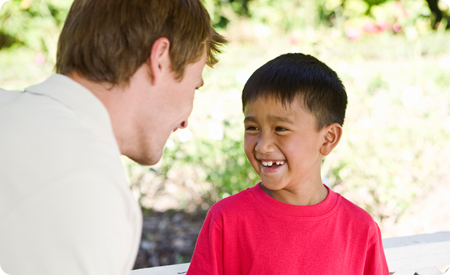
Communication, Communication, Communication

Did you check out our Top 10 Things Adopted Kids Wish Their Parents Knew webinar? Our panelists answered some pretty tough questions and openly told us about their histories. Throughout the webinar, there was one really strong theme for adoptive families -- create open lines of communication with your kids -- even if it's a one way street for a while.
It gives them permission...
Talking to your kids about adoption lets them know it's an okay conversation to have. The conversations Amy's family
had about adoption from the time she came home at four months old made her feel like she could ask questions.
Because her parents were open about her adoption she wasn't afraid to approach them…when she was ready.
All of our panelists, all from different circumstances, told us that loss is a big part of an adopted person's experience. When parents acknowledge that loss and talk about what feelings that may bring up, it gives their child permission to grieve. Trigger days -- birthdays, Mother's Day, other important holidays - are a reminder of the loss they suffered. If you've opened the lines of communication, it can help them manage these days better.
They may not be talking to you...that's ok
It's okay if your kids aren't coming to you to talk yet...you should still be taking. Don't feel like "it's not working"
and give up and shut the lid. Kids go through phases -- sometimes parents are cool, sometimes they aren't. Maybe
they aren't ready to talk about feelings or maybe they are talking to a friend or mentor instead. Talk about
adoption. Keep talking. Then they know they can too.
Steve, who was adopted from Korea, said he believes that every parent can approach this topic in a strong, helpful way. Even if your kid is not talking to you -- they have heard you.
But it's not just about talking...
Talking about adoption, birth families, and loss is important. But making your child's history a part of your
life is also very powerful. Both Nathan and Jessmynda who were adopted from foster care, talked about their adoptive
family's recognition of their birth family and culture. Jessmynda's family honors some of her birth family traditions by
making them their own. Nathan, who was adopted transracially, felt more a part of his adoptive family because they
honored his culture and heritage. Nathan told us there was a time when he didn't want to think about or
remember his birth family at all -- but his culture was still very important to him.
Maybe most importantly
Steve had a message for all adoptive parents -- it's never too late. If you haven't done it yet, start now.
Want more info on HOW to talk to your kids: check out our upcoming webinar:
Can We Talk? When Kids Start Asking About Adoption







